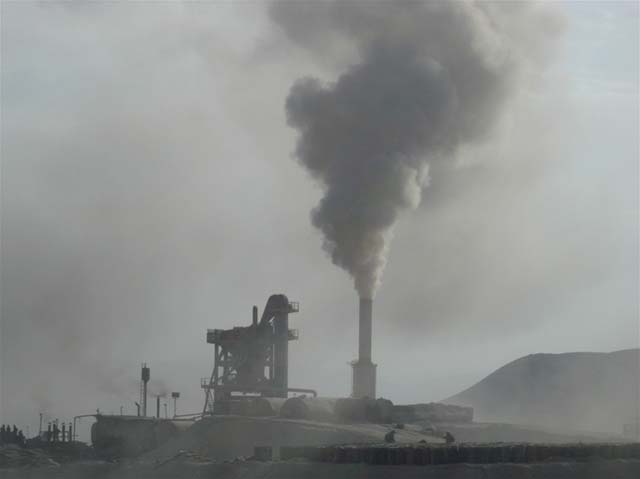Many governments and individuals still underestimate air pollution warnings while it recognized as a biggest life threatening enemy in the planet and likely to put the biggest brake on development in the future. According to World Health Organization (WHO), there are around 3,000 cities in the world which badly affected by air pollutions. Millions of people, including rich countries, are suffering from health issues such as cancers, heart and respiratory diseases that air pollution brings, the levels of air pollution in many Asian and African cities are said to be five or even 10 times worse. As ranked by WHO, Mazar-e Sharif and Kabul are graded the ninth and tenth most polluted cities in the world while Onitsha, a fast-growing city in Nigeria, got the first place in the globe. 98% of these cities, around 92 per cent of the world's population live in places where levels exceed recommended limits. And around 6.5 million people die annually from air pollution.
In addition, the intensity of air pollution has increased by 8% in the past five years. Levels of air pollution have reached toxic stage particularly in some countries that the World Health Organization (WHO) said it has become one of the world's biggest public health issues. Toxic fumes have reached levels so dangerous that the number of annual deaths caused by air pollution across the globe is now greater than those of Human Immunodeficiency Virus (HIV) and malaria combined.
The quandary of toxic levels of air pollution or smog affects many of the world's major cities in the world: from Kabul to Hong Kong and Shijiazhuang in China and multiple cities in Latin America. In late 2015, schools and offices were closed in China because of the toxic levels of smog that lasted for weeks. In December 2015, a blanket of thick gray smog covered skies in New Delhi, India. Tehran and Turkey also suffer tremendous levels of air pollution, especially during winter.
Recently, Commerce minister Humayon Rasa, Head of National Environment Protection Agency of Afghanistan, Mustafa Zahir, and Kabul Mayor Abdullah Habibzai called in the Wolesi Jirga to answer lawmakers regarding increasing of air pollution and trashes in Kabul city. Number of Parliament member while calling air pollution a silent killer, said that non-asphalted roads, low quality fuel, damaged cars, burning of substandard material by different factories and houses are the main factor behind high level of pollution in Kabul. They asked the related organs to exert utmost efforts to control pollution in Kabul as soon as possible. Commerce minister Rasa said that control of fuel is the duty of Afghanistan National Standard Authority, which the ministry has no the right to interfere. He said that refineries in the country has not the capacity to filter the fuel and produce fuel, thus it is required of government to directly import fuel. Head of National Environment Protection Agency of Afghanistan Mustafa Zahir said that 72 percent of pollution is caused by vehicle and dusty roads, 31 percent by commercial and personal institution burning substandard fire materials, 12 percent by brick factories.
Kabul Mayor Abdullah Habibzai complained of lack of enough equipment, facilities and staffs in Kabul. He said that our staff is for one million populations but currently, the population increased to around six million in Kabul. We need 600 vehicles, but only Kabul municipality have 170 vehicles, he noted. He said that Kabul municipality only had the capability to transfer 30 percent of trashes. Kabul municipality work over privatization of cleaning program of Kabul city, which will be implemented in coming two years, he claimed. He insisted that by privatization of cleaning program of Kabul, the problem of increasing of trashes will be solved. Substandard canalization system and house, lack of greenery and lack of standard transportation system are other challenges, which Kabul municipality will hold efforts to address the issue in future, he underlined.
It seems that the problem is rapidly worsening in Afghanistan, peculiarly in Kabul, due to mentioned reasons and lack of a true controlling plan. Dozens of the citizens die each year in Kabul while thousands others suffering from severe upper and lower chest infections, including asthma, chronic bronchitis and heart disease due the polluted weather. Reportedly, it caused 3,000 deaths last year whereas the condition is worse comparing to previous year owing to expansion in previous factors and additionally predicted less snow.
Though, People complain resentfully today and the full health tragedy will not be seen for many years. Because the effects of air pollution are chronic, or slow, they build up in the body and impact mostly on older people. Children exposed to heavy traffic fumes today will have smaller lungs and be more vulnerable to respiratory and heart diseases in their later years. It means, if we underestimate the issue now, we are storing up a health time-bomb for the future, guaranteeing that hospital wards will be full of wheezing people with hearts and lungs permanently damaged just by living in cities. The vast costs to the economy of caring for an increasingly infirm older population will have to be met later.
Lastly air-pollution crisis is not less important then fighting terrorism. The municipality needs to work with private company for rehabilitation of forests, ban the import and use of substandard fuel, improve waste management and at the same time build and strengthen the institutional capacity. It is also important to co-operate with the government in every aspect of issue to overcome the dilemmas and enjoy a life free of silent enemy such as air pollution and terrorist activities. The government is helpless to approach a conclusion in fighting against the silent enemy (air pollution) and terrorists, unless the people co-operate with it.
Home » Opinion » Pollution: The World Threatening Issue
Pollution: The World Threatening Issue
| Mohammad Zahir Akbari

